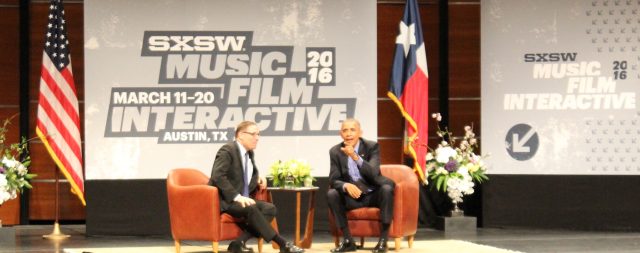
AUSTIN, Texas—In his keynote address at the 2016 South By Southwest conference, President Barack Obama responded directly to a question about cybersecurity in light of the ongoing Apple v. FBI case with answers that favored the American government's current position. President Obama even called out Edward Snowden's disclosure of classified documents in 2013.
When asked by moderator and Texas Tribune founder Evan Smith where he came down on the question of digital-device privacy versus national security, President Obama began his response by saying, "I can't comment on that specific case." Yet the President's lengthy response revolved around that case's core issues of encryption to a point that it appeared unmistakably related.
President Obama began his response by reminding the audience that law enforcement agencies can obtain a warrant, show up on a citizen's doorstep, and "rifle through your underwear to see if there's evidence of wrongdoing"—and they've been able to do so well before smartphones were invented.
What followed was repeated assurances that "we don't want government looking through phones willy-nilly" and an admission that "the whole Snowden disclosure episode elevated people's suspicions." Even so, Obama took the opportunity to claim that "the Snowden issue vastly overstated the dangers to US citizens in terms of spying. The fact of the matter is, our intelligence agencies are pretty scrupulous about US persons, people on US soil. What those disclosures did identify were excesses overseas with respect to people not in this country."
Obama then identified a key challenge faced by his administration: a desire for strong encryption to protect state secrets and infrastructure meeting an equal desire to be able to break encryption in specific circumstances. "If it's technologically possible to make an impenetrable device or system, where encryption is so strong that there's no key—there's no door—then how do we apprehend the child pornographer? How do we solve or disrupt a terrorist plot? What mechanisms do we have to even do things like tax enforcement? If you can't crack that at all, if government can't get in, then everyone's walking around with a Swiss bank account in their pocket, right?"
In short: Help us before Congress ruins everything
After briefly describing the complaints from the likes of Tim Cook and cybersecurity experts about a key that could unlock any device and reminding the crowd that "I am not a software engineer," Obama made his beliefs wholly clear. "You cannot take an absolutist view on this. If your view is strong encryption no matter what and we can and should create black boxes, that does not strike the balance that we've lived with for 200 or 300 years. And it's fetishizing our phones above every other value. That can't be the right answer."
Obama told the crowd that his dream scenario would involve robust encryption that could be unlocked by a key that was "accessible by the smallest number of people possible for a subset of issues that we agree are important." He next reminded the crowd that, again, "how we design [such a system] is not something I have the expertise to do." That's when the president made it clear that this view was partially fueled by fears of the larger American government machine taking such regulations over, and the tech sector's smartest people should join up now or risk greater digital-privacy consequences.
"We need the tech community to help us solve [this problem]," Obama said. "What will happen is, if everybody goes to their respective corners—if the tech community says, 'either we have strong, perfect encryption, or it's a Big Brother Orwellian world'—what you'll find is, after something really bad happens, the politics will swing. It'll be sloppy, it'll be rushed, and it'll go through congress in ways we haven't thought through. Then we'll have something really dangerous."
reader comments
367